What Is Ausbildung Qualitätsmanagement? A Comprehensive Overview
Discover Ausbildung Qualitätsmanagement, essential for ensuring high-quality standards in industries.

Overview:
Ausbildung Qualitätsmanagement refers to the training and practices that ensure products and services meet high standards of quality, which is essential for customer satisfaction and company reputation. The article highlights that effective quality management not only enhances organizational performance through recognized certifications like ISO 9001 and Six Sigma but also incorporates modern technologies and sustainability, thus addressing both consumer expectations and operational challenges in a competitive market.
Key Highlights:
- Ausbildung Qualitätsmanagement ensures products and services adhere to high standards, impacting customer satisfaction and company reputation.
- OpsNinja's support helps D2C brands improve customer experience and recover revenue, exemplified by a case where an Amazon seller increased item ratings significantly.
- Training and certification in quality management are crucial for professional advancement, with recognized programs like ISO 9001 and Six Sigma.
- The market for ISO certification in the Middle East is projected to grow at a CAGR of 13.7%, highlighting the value of legitimate certifications.
- Quality oversight is vital for D2C companies to build consumer trust, with 64% of consumers influenced by branded content on social media.
- Challenges in implementing quality management systems include employee resistance and the complexity of maintaining standards across diverse products.
- Technological advancements, such as AI and machine learning, are transforming quality management practices, enabling real-time monitoring and predictive analytics.
- Sustainability is becoming integral to quality management, requiring organizations to incorporate ethical production into their assurance frameworks.
- Investing in quality management practices can lead to significant reductions in customer complaints and improved organizational performance.
Introduction
In an increasingly competitive marketplace, the significance of quality management cannot be overstated. As businesses strive to meet ever-evolving consumer expectations, effective quality management practices emerge as a cornerstone of success, particularly for Direct-to-Consumer (D2C) brands.
This article delves into the multifaceted world of Ausbildung Qualitätsmanagement, exploring its essential principles and the critical role it plays in enhancing product reliability and customer satisfaction. By examining:
- Training pathways
- Certification importance
- Challenges faced in implementing robust quality management systems
organizations can better navigate the complexities of this discipline.
Furthermore, insights into future trends highlight the transformative impact of technology and data analytics in shaping quality management strategies. Through the lens of real-world examples, this exploration underscores the imperative for businesses to prioritize quality management as a means of fostering trust, loyalty, and sustainable growth.
Understanding Ausbildung Qualitätsmanagement: An Overview
Ausbildung Qualitatskontrolle, or excellence training, encompasses essential principles and practices designed to ensure that products and services consistently adhere to high standards of excellence. This discipline is crucial across various industries, as it directly influences customer satisfaction and company reputation. Effective performance oversight involves systematic processes, including planning, controlling, and enhancing standards throughout production and service delivery.
With OpsNinja's committed support team, D2C brands can improve their customer experience in supply chain management, significantly raising item ratings and revenue recovery. For example, through customized evaluations and thorough standards assessments, OpsNinja assisted Amazon seller Maurice Mann regain $1 million by raising his item ratings from 3.5 to 4.7 stars. Their specific methodologies included detailed item inspections and feedback loops that informed enhancements.
Furthermore, The Mindful Collective changed their strategy for oversight with OpsNinja, employing their extensive assurance solutions to scale effectively on Amazon. The focus on Ausbildung im Qualitätsmanagement underscores the necessity of equipping professionals with the skills required to effectively implement these standards, thereby fostering high levels of product reliability and customer trust. As organizations work to satisfy changing consumer expectations, the importance of ausbildung qualitätsmanagement becomes increasingly crucial in fostering a positive employee experience and improving overall workplace culture.
In fact, 92% of survey respondents indicated that training goals should reinforce a positive employee experience, underscoring the importance of aligning training with employee needs. As Devlin Peck, creator of DevlinPeck.com, highlights, effective training is crucial for upholding high standards in today’s swiftly changing business landscape, particularly as companies encounter difficulties in keeping pace with technology—60% of contact center leaders foresee this as their primary challenge. The incorporation of excellence standards becomes more crucial than ever, and OpsNinja's services play a key role in reaching these training objectives.
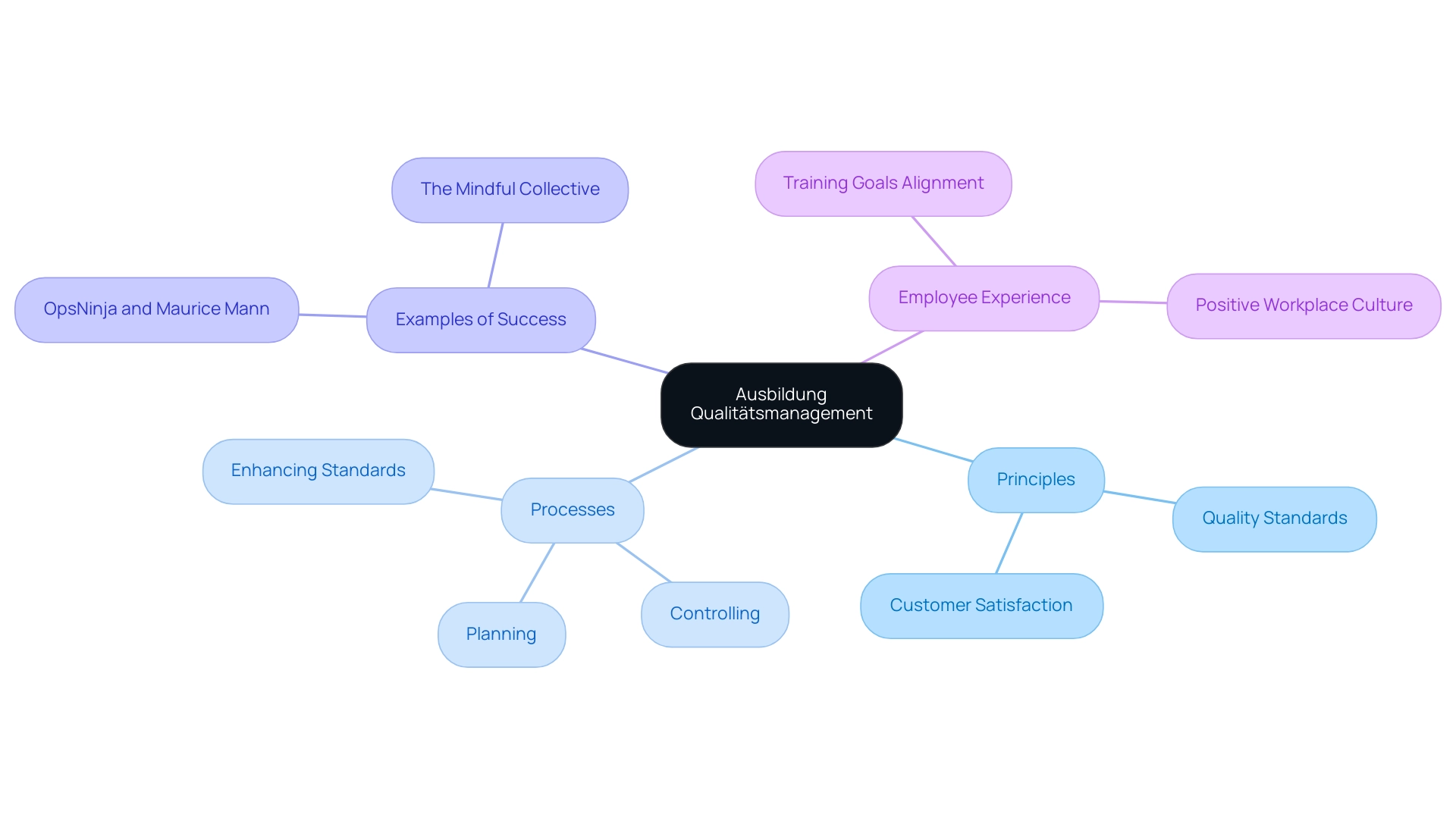
Training and Certification Pathways in Qualitätsmanagement
Training and certification through ausbildung qualitätsmanagement are vital for professionals looking to elevate their expertise and career trajectory. Various educational pathways exist, including:
- Formal degree programs
- Interactive workshops
- Flexible online courses
Among the most recognized certifications are:
- ISO 9001, which emphasizes the establishment of effective assurance systems
- Six Sigma certifications, renowned for their focus on process enhancement and operational excellence
These training programs explore fundamental subjects such as:
- Assurance techniques
- Statistical process control
- Risk strategies
Obtaining these certifications not only equips professionals with critical skills but also signals their dedication to upholding high-quality standards through ausbildung qualitätsmanagement within their organizations. This commitment is particularly crucial in today’s context, where the integrity of ISO certifications is under scrutiny, especially in regions like the Middle East, particularly the UAE, Saudi Arabia, and Qatar, where the proliferation of accredited yet potentially fake ISO 9001 certificates raises concerns.
As the market for ISO certification across the Middle East and Africa is projected to grow at a CAGR of 13.7%, reaching a market size of USD 24.2 million in 2024, and with the market in China projected to reach a valuation of US$ 13.25 billion by the end of 2034, the value of legitimate certifications is increasingly evident. Therefore, professionals who pursue these credentials significantly enhance their employability and potential for career advancement. As one industry expert noted, 'Organizations prioritize ISO certifications like ISO 27001 to ensure data protection and secure IT infrastructure.
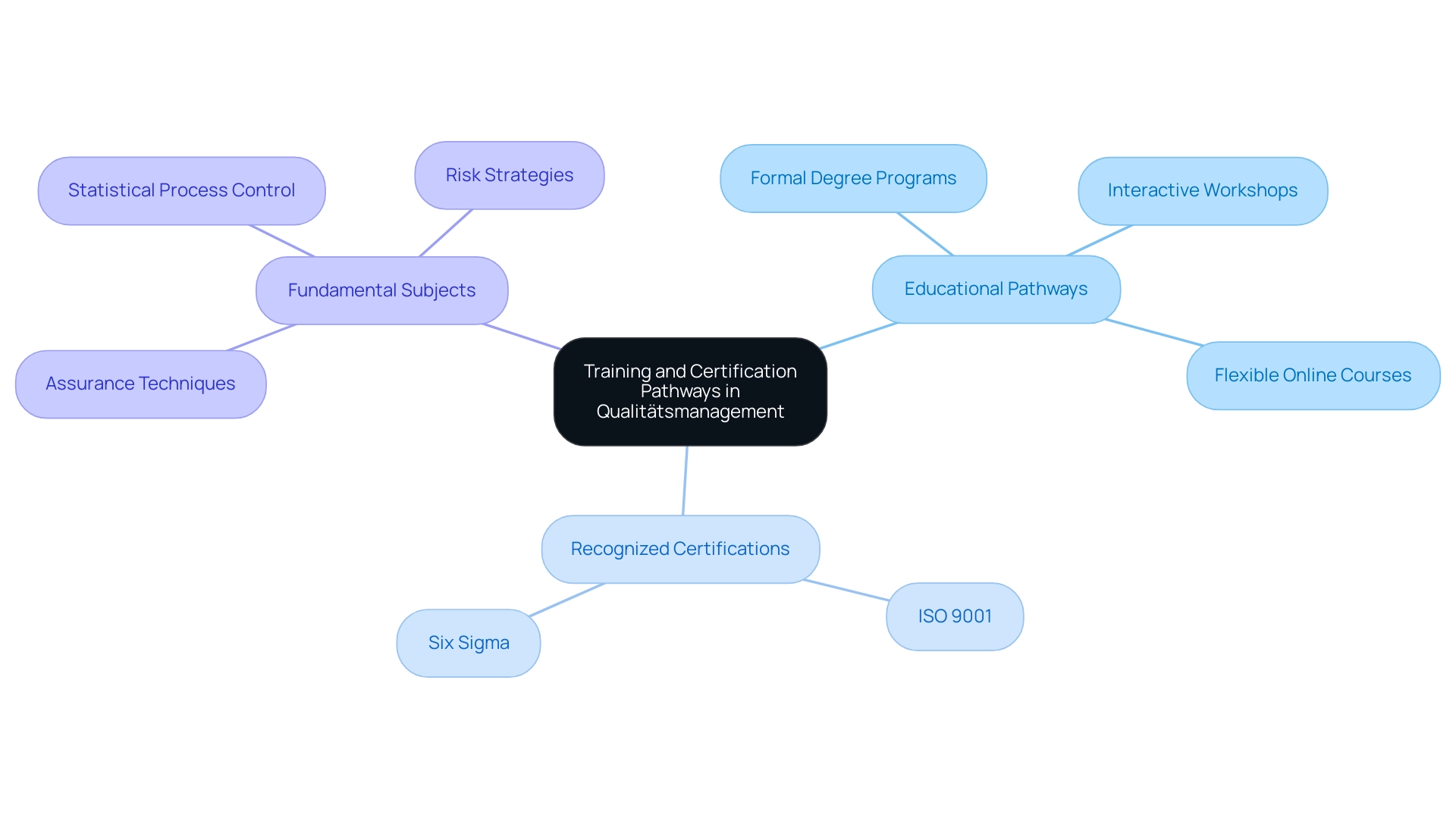
The Importance of Quality Management in D2C Brands
Quality oversight is crucial for Direct-to-Consumer (D2C) companies functioning in a progressively competitive market defined by heightened customer expectations. Effective practices for ensuring excellence allow these companies to uphold consistency, reliability, and safety—essential components required for fostering trust and loyalty among consumers. Significantly, research shows that 64% of consumers are more likely to buy an item after interacting with branded content on social media, emphasizing the significance of excellence in shaping favorable consumer views.
Moreover, D2C companies greatly rely on direct consumer feedback to improve their offerings, making excellence oversight an iterative process that develops in reaction to customer needs. With OpsNinja’s customized checklist assistance, companies obtain personalized assessments specifically crafted for their distinct items, optimizing the inspection process and enhancing revenue recovery. For instance, Hash Stash reported a 25% decrease in returns after adopting OpsNinja’s management solutions, highlighting the concrete advantages of these practices.
By implementing strong assurance protocols, companies can greatly minimize the chance of involuntary churn, leading to an astonishing 30% decrease in sales because of payment failures. This proactive approach not only minimizes product returns but also amplifies customer satisfaction—a crucial factor in driving growth within competitive market segments. An engaging case study emphasizes how subscription models, preferred by numerous D2C companies for consumables, improve customer convenience and retention, thus strengthening the significance of excellence oversight in maintaining ongoing sales.
Furthermore, a solid company reputation can greatly lower hiring and training expenses, drawing skilled workers; over 90% of individuals would contemplate a job offer from an organization with an excellent corporate standing. As D2C companies traverse the terrain of 2024, emphasizing excellence supervision with the expertise of Ops Ninja will be essential to establishing lasting customer trust and loyalty. According to Motista, the lifetime value of customers is 306% greater for brands that effectively oversee standards, further highlighting the significant influence of standard oversight on long-term success.
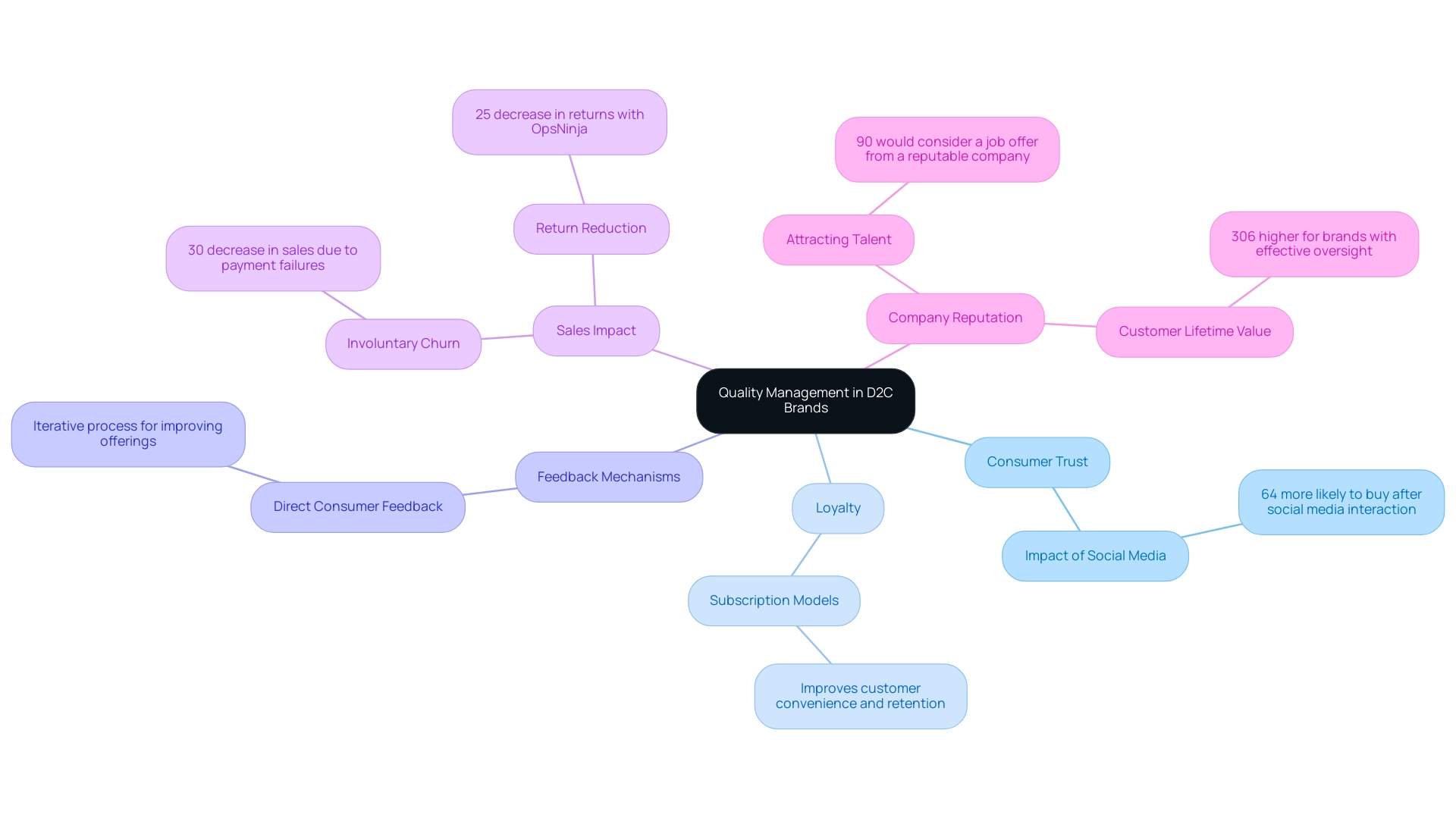
Challenges in Implementing Quality Management Systems
Implementing management systems often faces significant challenges, most notably employee resistance to change. This resistance can stem from a lack of understanding of standards, such as AQL numbers, which are essential metrics that guide the sampling process during inspections. AQL figures indicate the permissible standards for batches and define how many items should be examined and what amount of flaws is acceptable.
This guidance assists brands in safeguarding their reputation from adverse reviews arising from substandard products. Cattell's research on the scientific application of factor analysis in behavioral sciences highlights the significance of comprehending employee conduct in the context of excellence oversight. For numerous organizations, aligning excellence objectives with wider business aims can result in disjointed efforts that weaken the impact of improvement initiatives.
As brands grow rapidly, maintaining consistent standards across diverse product lines becomes increasingly complex. The modified R-squared value for performance improvement models stands at 0.666, indicating a substantial relationship between excellence practices and organizational performance. According to Statista, the average expenditure on employee learning and development increased to almost $1,300 per worker in 2021, highlighting the necessity of comprehensive training programs like ausbildung qualitätsmanagement to enable smoother transitions to effective management practices.
Moreover, organizations that adhere to ISO 9001 principles can ensure consistency in product delivery, enhance competitiveness, and embed a culture of continuous improvement. Selecting a contemporary control platform like OpsNinja, which provides unique features such as real-time monitoring, customized inspection plans, and seamless integration with production processes, can further streamline these efforts, offering significant advantages for D2C brands. To effectively navigate these challenges, fostering a culture of excellence is essential.
This can be accomplished by actively engaging employees at all levels in the performance oversight process, utilizing technology to enhance control measures, and applying proactive strategies to address resistance. A significant case study emphasizes that companies investing in excellence practices report a 40% decrease in customer complaints, demonstrating the concrete advantages of prioritizing standards in organizational strategies. By adopting these approaches, companies can establish a resilient performance framework that not only enhances product safety but also drives customer satisfaction.
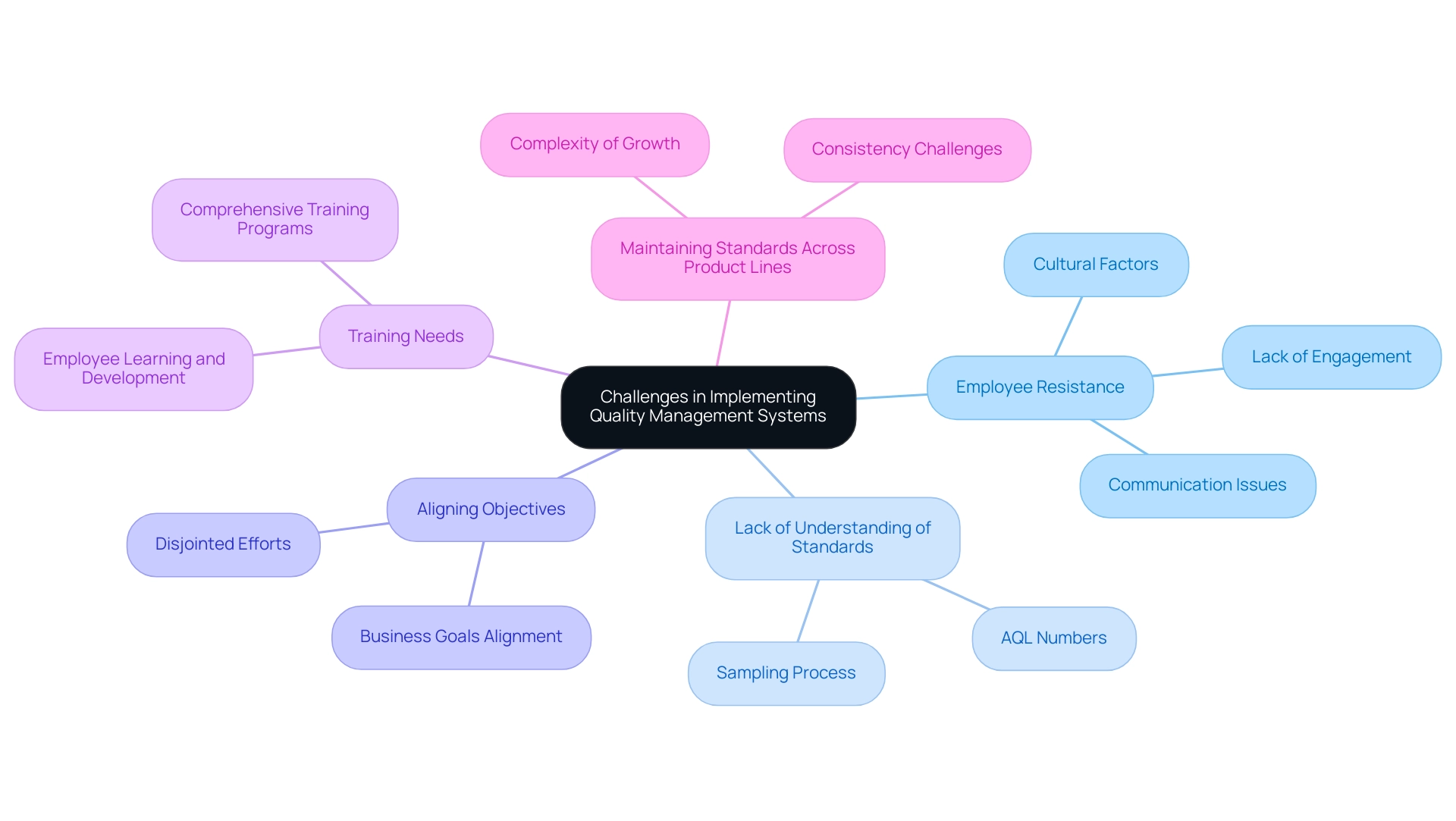
Future Trends in Quality Management
The landscape of performance management is evolving rapidly, driven by advancements in technology and data analytics. OpsNinja exemplifies this transformation, having positively influenced hundreds of D2C brands by streamlining their control processes. Artificial intelligence and machine learning are becoming essential tools in enhancing control, enabling organizations to implement real-time monitoring and predictive analytics that proactively identify issues before they escalate.
As mentioned in the TDWI 2024 State of Data Quality Report, James Kobielus notes that
Standardized processes for addressing enterprise-wide data concerns are starting to gain traction
emphasizing the increasing acknowledgment of the significance of data integrity in oversight. Furthermore, notable success stories, such as those from Hash Stash, demonstrate how OpsNinja's thorough inspections have facilitated 10,000 monthly evaluations, significantly reducing negative customer reviews and complaints. A statistic showing that 19% of contact centers are using AI technology for natural language processing demonstrates the growing acceptance of AI across different fields, including performance oversight.
The incorporation of excellence control systems with supply chain tools is becoming more common, ensuring that standards are upheld across all operational stages. This trend not only facilitates a more comprehensive approach to assurance but also aligns with the rising consumer expectation for sustainability. Organizations are now faced with the task of integrating sustainable practices within their assurance frameworks, thereby ensuring that ausbildung qualitätsmanagement encompasses not just product superiority but also ethical production and environmental stewardship.
Furthermore, scalability of assurance tools is essential, as these systems must develop to handle increased data, users, and demands as organizations expand. As we look forward to 2024, these technology-driven trends will keep influencing the future of standards, requiring flexibility and creativity in response to changing market needs. For additional insights and to learn how other brands have effectively transformed their process oversight with OpsNinja, we encourage you to explore more customer stories.
Moreover, understanding the differences between OHSAS 18001 and ISO 45001 can help organizations in their ausbildung qualitätsmanagement by choosing the appropriate safety management systems, further enhancing their quality management strategies.
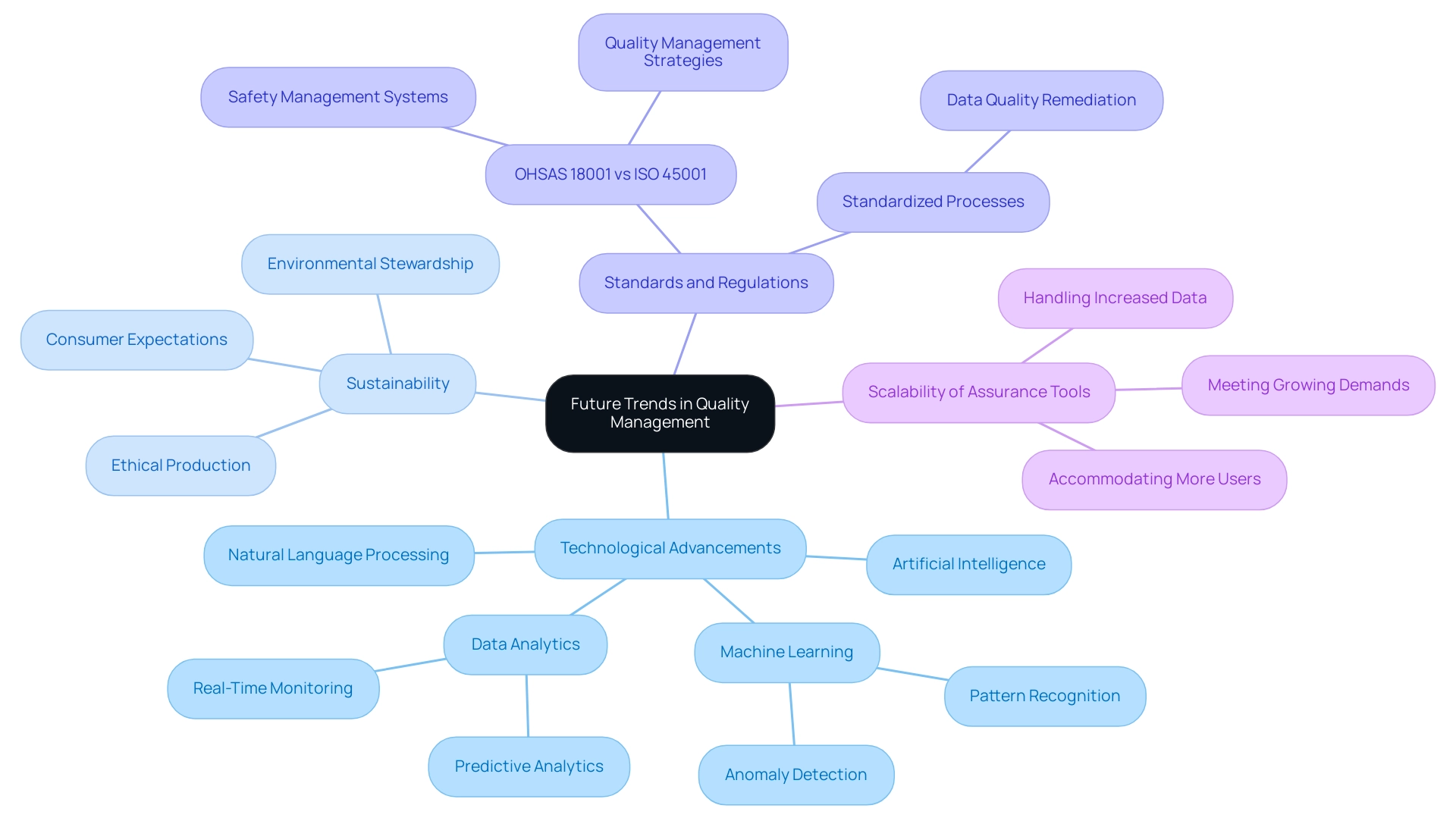
Conclusion
The exploration of Ausbildung Qualitätsmanagement reveals its pivotal role in ensuring that D2C brands not only meet but exceed consumer expectations in a competitive marketplace. The article highlights the importance of quality management training, emphasizing the need for professionals to acquire relevant certifications and skills that directly impact product reliability and customer satisfaction. With the integration of comprehensive training pathways, such as ISO and Six Sigma certifications, organizations can foster a culture of quality that enhances their operational excellence and brand reputation.
Moreover, the challenges associated with implementing robust quality management systems are underscored, particularly the need to address employee resistance and align quality objectives with broader business goals. By investing in effective quality management practices, brands can significantly reduce product returns, enhance customer trust, and ultimately drive sustainable growth. The success stories of companies leveraging quality management solutions, like those provided by OpsNinja, serve as powerful examples of the tangible benefits that arise from a commitment to quality.
Looking ahead, the future of quality management is shaped by technological advancements and a growing emphasis on data analytics. As organizations adapt to these changes, they must prioritize the integration of sustainable practices within their quality management frameworks. By doing so, they not only enhance product excellence but also contribute to ethical production and environmental stewardship. Embracing these trends will be essential for D2C brands aiming to build enduring customer loyalty and trust in the years to come.



